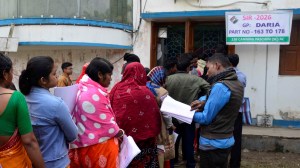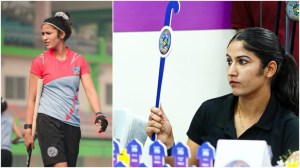Behind the Ban
The film industry in Karnataka remains an unequal and sexist world.
The film industry in Karnataka remains an unequal and sexist world.
Those who have been following national news over the past fortnight would be familiar with the triangular trouble in the Kannada film industry. Top actor Darshan was arrested on September 9,after wife Vijayalakshmi was admitted to a Bangalore hospital,nursing a broken arm,a torn earlobe,cigarette burn marks on her throat and a black eye. The next day,Nikita Thukral,30,a Kannada heroine raised in Mumbai,was banned from Kannada films by the Karnataka Film Producers Association KFPA for three years. The trigger: Nikitas name was mentioned by the wife in her police complaint.
In prison,Darshan,invincible superhero of dozens of action films,self-confessed fitness freak who pumped iron for hours in the gym,collapsed due to asthma and a sudden bout of jaundice. Even as he was whisked away to the hospital,his fans went on a rampage. By evening,top Kannada stars Ambareesh and Vijay had convinced wife Vijayalakshmi to reconcile with her husband and withdraw her complaint.
Darshan,on whom 30 crore rupees ride by way of yet-to-be-released films,faced no ban,not even a reprimand. For Nikita,though,a mere mention in a complaint was enough for the self-styled daddies of Sandalwood Kannada film industrys nickname to teach a lesson to these heroines who come from Mumbai and elsewhere and distract our boys. Nikita was not informed of the ban,much less asked for her version.
As the news churned on every channel,a group of producers had managed to do what even the best Kannada movies have not: Stay on the national headlines for five days,and draw coverage by even BBC and The Guardian that ran reports of Indian actor banned over alleged affair with costar. The intense media spotlight helped,the producers association did a U-turn,revoking the ban on September 15,admitting our foolishness to impose a ban on such a good girl.
If Darshan and his wife have a problem,how am I to be blamed? Just five days earlier,the good girl had asked. But the KFPA had preferred to ban her,as it has done in the past often and mostly against its leading women. A few samples: Actor Pooja Gandhi,who had alleged that the producer of her film Nee Illade still hadnt paid her the Rs 4 lakh that was due,was asked by KFPA to say sorry or face a ban. In March this year,top star Ramya was handed a one-year ban. This too over the issue of pending payment. When producer Ganesh showed no signs of returning the Rs 10 lakh that he had borrowed from her,Ramya protested by keeping away from the audio release of the movie Dandam Dashagunam. KFPA wielded its favourite weapon: a ban.
A furious Ramya chose to take the battle to Twitter. For the first time in Sandalwoods history,fans watched such drama live,with Ramya tweeting to her fans the real story. The KFPA postured harder,asking for an apology for her tweets,only to backtrack in embarrassment as pressure by her fans mounted heavily against its stand.
Ramya,now a veteran of two bans she faced her first ban that was later repealed in May 2009 laughs when asked about KFPAs favourite tool. I knew from day one that the ban wont work. I even put it out on Twitter. I said as much when I called Nikita to comfort her. But she kept crying.
Even as bans in Kannada filmdom are revoked as suddenly as they are handed out,no one seems to think of their after-effects. Nobody can compensate for the harrowing time you go through with your family when they announce the ban. The first time I faced it,I cannot tell you what I went through. I cried my eyes out at the press conference. Just imagine,the media is firing questions at you,the association has banned you. And every time you stand up for yourself,you are labelled a troublemaker,a controversy creator. So the second time this happened,I put it out on Twitter that I am quitting the industry! says Ramya.
But there is no shortage of spunk these days. Actresses who get paid half or even less than what their male counterparts earn for a film,have started demanding their due in an industry that is seen as blatantly pro-male. When it comes to remuneration the disparities boggle. Kannadas top actor Puneet Rajkumar apparently commands over Rs 2 crore a film,Ramya remains the top-paid heroine at a reported Rs 35 lakh per film. The hero is always the bigger person in the movie,and the producer is always at his beck and call. The heroine has to comply,whether it is about dates or screen space. If you oppose it,you are the bad one, says Ramya.
Kannada movies in recent years have also been in the news for other bad reasons. Veteran film critic VN Subba Rao who has followed the industry closely for half a century says,Look at Tamil cinema today. There are genuine producers,financiers,directors there. Unfortunately,for Kannada films,Telugu cinema has become the role model. The theme of excessive violence has come from there. While the Tamil industry is going through a fresh wave of experimentation,here in Karnataka,more and more unprofessional people are landing up with real estate money.
You cant make a rule that only nightingales can sing in the forest. The foxes too will insist on singing, says Ramesh Aravind,one of south Indias well-established actors. Quoting Tamil director Balu Mahindra,he says,The macchu-laangu movies euphemism for the axes and long swords used on screen stories are dying a natural death. Remember,there was one phase where,in every movie,a chief minister would get blown to smithereens? Then,there was the other phase where you had to have an honest cop as the hero. This too shall pass, says Aravind whose latest Kalla Malla Sulla,a comedy is on its way to becoming a super hit.
Film journalist and critic Vishakha N believes that the lack of leadership is leaving the industry directionless. Associations are aplenty there is one each for directors,artistes and producers. And then there is the Karnataka Film Chamber of Commerce. But the divide between the groups results in rules being broken as soon as they are made. Money is mostly for producers,as the satellite television rights for films are high as Rs 2 to 2.5 crore,says Vishakha.
So where is the space or appetite for quality cinema? Or for women-oriented roles like the ones made famous by actors like Suhasini Manirathnam or the late Kalpana?
While leading ladies of Sandalwood remain largely anonymous and un-loved,the male leads are called names lovingly coined for them. In which other industry would you find fawning titles like Crazy Star reserved for veteran actor Ravichandran,Power Star Puneet Rajkumar,youngest son of Dr Rajkumar,Lovely Star Prem,for his apparent good looks or even Challenging Star for the very same Darshan?
Vasanthi Hariprakash is a Bangalore-based writer
- 01
- 02
- 03
- 04
- 05






























